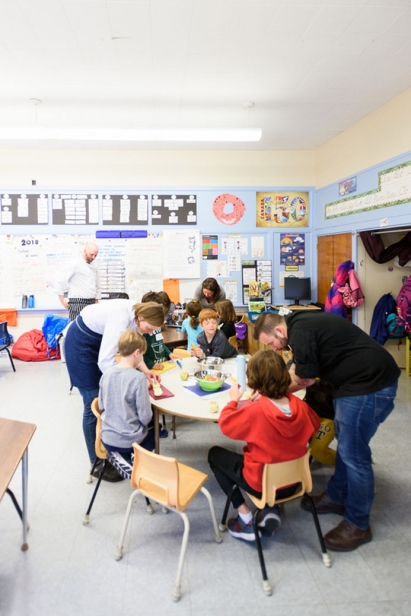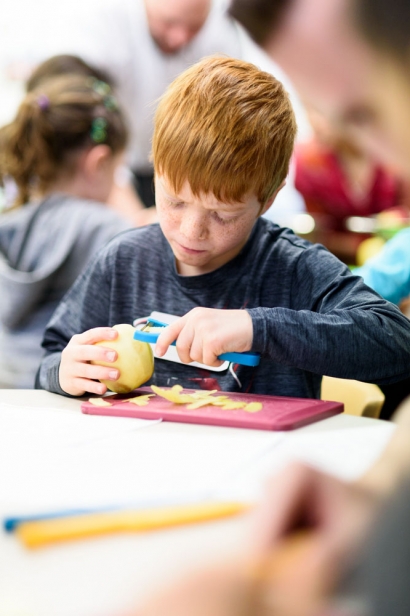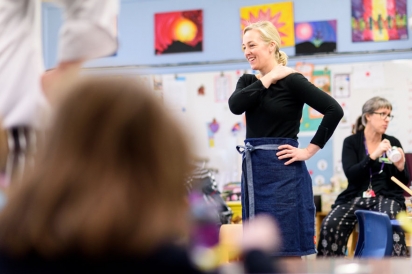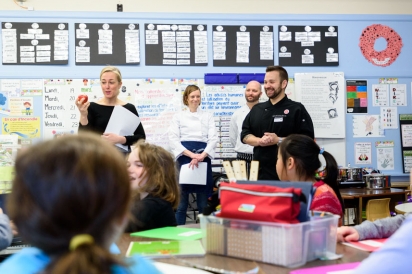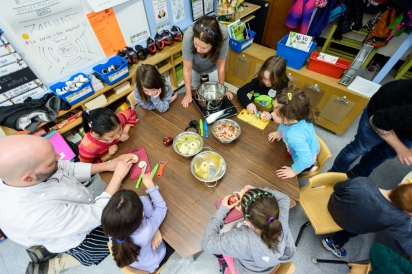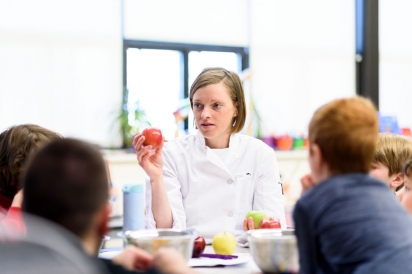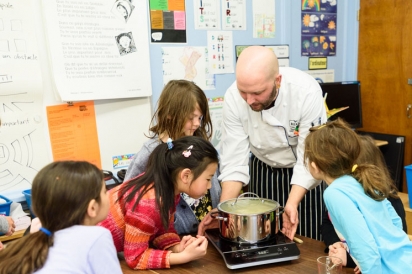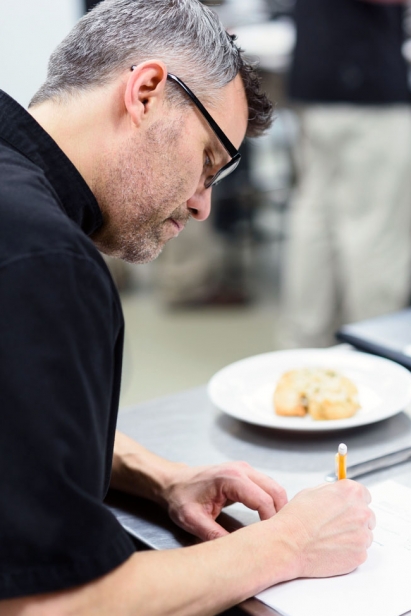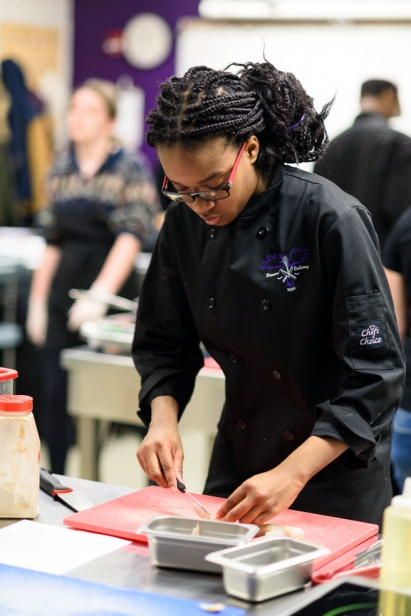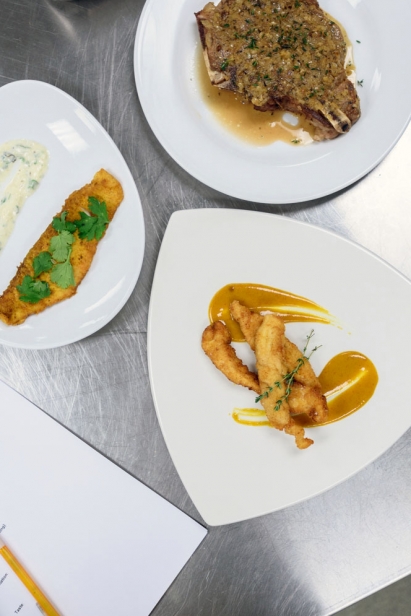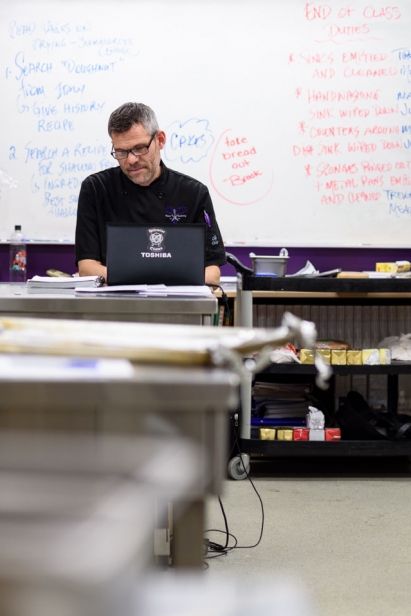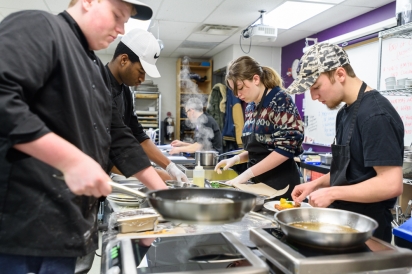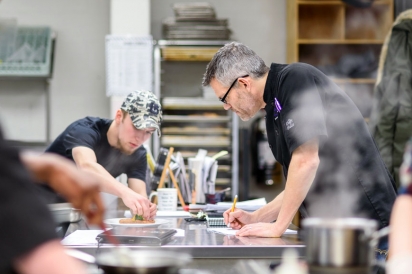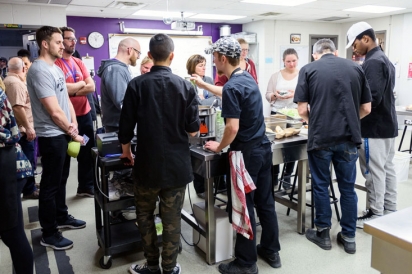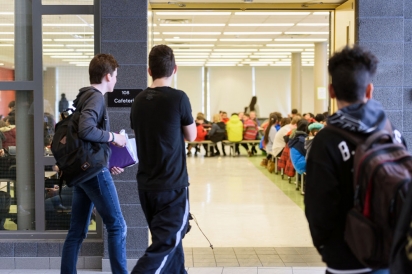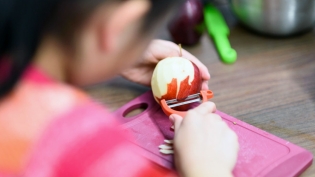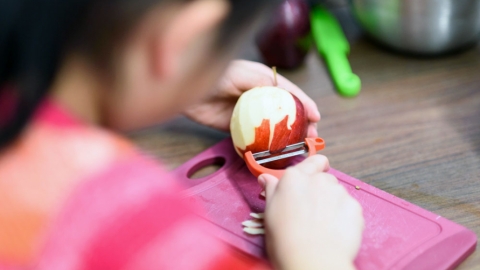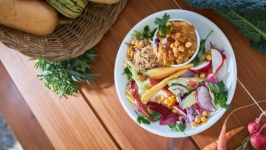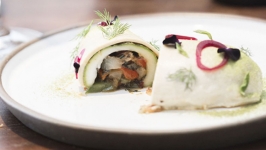Cultivating Cooks
Whether you eat to live or live to eat, there’s no denying the importance food plays in our lives (though chances are, if you’re reading this publication you probably fall into the latter category). Although the current zeitgeist would paint our society as one fairly obsessed with our food, it’s easier than ever to be disconnected from it. With convenience often dominating the culinary landscape, it’s perhaps not surprising that food literacy is a modern day concern.
So why is something that plays such a crucial role in our lives, given so little attention in schools? Educators with Cultivating Cooks and at Longfields Davidson Heights Secondary School are among those who believe food education should be part of a standard curriculum and are working in and out of the school system to equip kids with food knowledge and skills.
Chef Anna March met Carley Schelck when she was hired to work at The Urban Element, a culinary studio and event space in Hintonburg co-owned and run by Schelck. March had previously volunteered with an organization in Vancouver called Growing Chefs and mentioned to Schelck that she was keen to find a similar organization to help in Ottawa, but wasn’t finding one. March credits Schelck’s entrepreneurial “go-getter” attitude with suggesting they create their own program. The plan sat on the back burner for a little while, but last year they decided it was time to pursue this passion project — and Cultivating Cooks was born.
Cultivating Cooks looks to build “knowledgeable and enthusiastic cooks, farmers, gardeners, nutritionists and community leaders” from a young age through classroom-based programs. It had its first pilot run at Woodroffe Avenue Public School last year and is slated to be in three schools this spring, as well as at a community centre day camp for the summer.
Schelck and March have designed a 10-week program that takes kids through the food cycle from seedlings to harvesting a garden, reading and writing recipes, simple cooking and taste testing. Classroom segments are designed to fit into the 50-minute school periods and every component of Cultivating Cooks’ workshops has a tasting or cooking aspect to highlight the connection between all the processes and where food comes from.
The pair works with teachers to make sure the workshops tie into some part of the already existing curriculum, given that teachers cannot deviate too much from what they already have to teach.
“Teachers have a ton to do, they have so much content to get into those little kids’ brains before the end of the school year,” March explains, but she says that every teacher they’ve worked with so far has been keen to find a link. In Grade 5, for example, they tied their workshops into classes on renewable energy and in Grade 3 they made the link with their unit on soil — easy subjects to segue to food and food production.
Once the Cultivating Cooks’ materials are translated, they’ll be set to work with the schools’ French immersion programs as well. Cultivating Cooks also has a roster of volunteers — chefs, bee keepers, food producers — who share their vision and specialized knowledge during the workshops.
March says bringing the program into classrooms is important since kids are already in an educational environment. Schelck says that surrounded by their friends, they’re more likely to be keen to try something new, “We all know how parents try to get vegetables in — in this environment we make it fun and when they see their peers tasting, they’re more likely to get into it.”
Both women are mothers and say this catalyzed their desire to get Cultivating Cooks off the ground. With Urban Element's focus on food education-based events and classes, it was a natural transition. “Ever since having a child and seeing them in the school system, I’ve realized just how important food is — it can be a learning tool as well as a connector with them and their community,” Schelck says.
The feedback from participating educators, students, and parents has only been positive. Cultivating Cooks has received drawings and stories in the mail from happy students and parents have even called to get a veggie-heavy recipe that their regularly picky-eater daughter loved. But the implementation of the program hasn’t been without challenges. “The only resistance has been the funds,” Schelck explains. To bring an outside program into a class, the school has to have interested teachers, a principal and/or a parent council that’s on board and the funds to afford it. As the duo has quickly learned, not all schools are dealing with the same resources. Some schools already plant community gardens or grow towers and they also have an active fundraising parent council, while others have nothing of the kind. March flags this as one of the most challenging aspects of the program. “Some of the schools that could really use the program and where the principals and teachers are keen, just can’t afford it,” she says.
To that end, they've tailored their 10-week program to suit the schools they are working with, acknowledging that a one-size-fits-all isn’t the way to go for the time being. They’re hoping to run a fundraiser later this year to help subsidize schools that can’t afford the programming and are looking into applying to various provincial grants for financial help. Despite the financial bumps in the road, the two are feeling positive about the future of Cultivating Cooks. “Everyone wants better food. Everyone wants better food literacy. It’s just that nobody wants to pay for it,” March says.
It’s a sentiment that Tony Christoforatos and Kent Van Dyk echo. Both are chefs and teachers in Longfields Davidson Heights Secondary School’s (LDHSS) culinary program and would like to see food education integrated in some way from kindergarten to Grade 12. Money is an issue. Van Dyk calls food education “vitally important... and a valuable life skill that engages them on a lot of different levels [such as] the environment, social enterprises, social inequalities and trade,” to name a few. But for food education to be incorporated board- or province-wide, funding would be required to develop teaching materials and, potentially, facilities.
LDHSS is unique. The school has two fully equipped kitchens and is one of a few high schools in Ottawa that offers a culinary and hospitality related Specialist High Skills Major (SHSM). The SHSM at LDHSS lets students interested in the culinary and hospitality industries choose courses that focus on that career path while completing requirements to receive their high school diploma. They have about 20 students a year completing the SHSM and approximately 200 students in 12 classes in the culinary arts program, which runs classes in Grades 9 through 12. Christoforatos and Van Dyk have seen the program triple in size; there were only four classes when LDHSS first opened nine years ago.
Every class begins with labs on knife and kitchen safety and includes lessons on fundamental cooking techniques before students apply them on their own. Christoforatos teaches all the Grade 9 classes and likes to base lessons around cooking breakfast, lunch and dinner. A highlight for grade 10s is demonstrating some of the techniques they’ve learned at the end of the semester by making pizza from scratch. That means making their own dough and properly simmered sauce, pulling their own mozzarella or making ricotta (Van Dyk says they’re essentially “trying to teach them things without them realizing they’re learning science”). There are Iron Chef-type challenges and Black Box competitions that push students to tap into their creativity and showcase their training. Senior students also learn about business plans, restaurant management and costing ingredients and can participate in catering gigs. To raise funds for the program, Grade 12 students sell lunch to teachers on “Souper Fridays” with a soup and side they’ve made — from scratch, of course.
A highlight for many of the students is the annual Food for Thought dinner, held in January ever year. The event has students working with some of the city’s best known chefs to create a six-course meal with (non-alcoholic) drink pairings. Mentored by kitchen and service professionals, students pull off an impressive dinner for more than 100 guests, with proceeds going to charity. Anna March has twice been one of the chef-mentors at the event, which often sees chefs returning year after year to work with the students.
The culinary arts program balances group work with a lot of independent research and room for individual creativity. Like Schelck, Van Dyk emphasizes the role of food and cooking as a connector. LDHSS is a very diverse school — Van Dyk estimates that there are roughly 20 countries represented in any of the culinary arts classes. To break up safety and introductory labs at the beginning of each semester, students are asked to bring in and present their “world in one plate,” a dish that represents their culture. Van Dyk says the exercise exposes students to cuisines outside of their own and has them recognize the similarities that exist in cooking beyond borders. “Every culture has a dumpling,” Van Dyk uses as an example. Whether it’s a pierogi or a gyoza, “every culture has dough wrapped around a filling.”
Cultivating Cooks and the culinary program at LDHSS aren’t alone in working to equip kids with better food education. In 2013, the Canada Agriculture and Food Museum added the word ‘Food’ to its name to emphasize the link between agriculture and food and expanded its programming to include food literacy.
In 2017, the Ottawa Public Library launched its food literacy program, known as à la carte, to “raise awareness about how we are connected to the food we eat and grow.” Cultivating Cooks is also a part of the Ottawa School Food Network (ottawaschoolfood.ca), a group of non-profit agencies and community initiatives with a collective mission to get good food into schools.
Schelck and March see traction and interest in Cultivating Cooks growing. Their goal is to have so many schools on board that they’re no longer able to be facilitators in every classroom and will deploy their trained volunteers to deliver prepared workshops. Their long-term dream is to convince decision-makers at the board level that this kind of programming should be in all schools. LDHSS has also seen its program grow and Van Dyk and Christoforatos hope to see food education become more prevalent across the board.
At the end of the day, both Cultivating Cooks and the culinary arts program are trying to demystify food for their young charges and set them up to be confident and thoughtful consumers. And while change may be slow, these educators are certainly cooking up some interest amongst the city’s youth.
Cultivating Cooks
cultivatingcooks.com, 613.552.4873
Longfield-Davidson Heights Secondary School
149 Berrigan, Ottawa, Ont.
ldhss.ocdsb.ca, 613.843.7722



